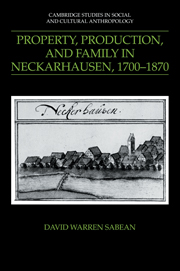Book contents
- Frontmatter
- Contents
- List of tables
- Abbreviations
- Abbreviations of sources
- Weights, measures, and coinage
- On reading kinship diagrams
- Glossary
- Preface
- Dedication
- Introduction
- 1 Productive forces and social differentiation
- 2 Magistrates and records
- 3 The ideology of the house
- 4 Patterns of marital conflict
- 5 The changing context of production
- 6 Marital relations in the context of production
- 7 Marital estate
- 8 State and estate
- 9 Marital fund
- 10 Generational transition
- 11 Reciprocities of labor and property
- 12 Reciprocities in parent–child relations
- 13 Authority, solidarity, and abuse
- 14 Family charges on the transfer of property
- 15 The real estate market
- 16 Kinship and the sale of property
- Conclusion
- Appendix
- Bibliography
- Index
- Cambridge studies in social and cultural anthropology
- Frontmatter
- Contents
- List of tables
- Abbreviations
- Abbreviations of sources
- Weights, measures, and coinage
- On reading kinship diagrams
- Glossary
- Preface
- Dedication
- Introduction
- 1 Productive forces and social differentiation
- 2 Magistrates and records
- 3 The ideology of the house
- 4 Patterns of marital conflict
- 5 The changing context of production
- 6 Marital relations in the context of production
- 7 Marital estate
- 8 State and estate
- 9 Marital fund
- 10 Generational transition
- 11 Reciprocities of labor and property
- 12 Reciprocities in parent–child relations
- 13 Authority, solidarity, and abuse
- 14 Family charges on the transfer of property
- 15 The real estate market
- 16 Kinship and the sale of property
- Conclusion
- Appendix
- Bibliography
- Index
- Cambridge studies in social and cultural anthropology
Summary
An egalitarian system is profoundly disturbing by virtue of the fact that it tends to undermine family and village holdings.
- Martine SegalenRealty and reciprocity
We have pointed out many ways in which obligation was tied up with the exchange of land and other forms of wealth. In Neckarhausen, in the nineteenth century, the authority exercised by parents over adult children and the respect the latter were supposed to demonstrate were both derived expressly from the fact that parents were the source of wealth. Having to make explicit what had always been implicit suggests a weakness in the argument, but parents also wove a web of obligation through a calculated strategy of property devolution.
The paradoxes and ambiguities of family obligation are best illustrated by the readiness of family members to care for each other. Whenever an aged parent or uncle or a long-ill brother or sister was nursed for any length of time, the relatives responsible for the care kept careful book. They expected to be able to utilize any common rights such as a garden or portion of firewood, and they always put in a bill at the final division of the estate. Siblings sometimes agreed among themselves how the matter should be taken care of and paid a specified amount to the one who offered care. But more frequently, a parent or uncle contracted for the care, passing on various properties and making specific agreements with one child or niece or nephew for cooking, washing, and nursing, explicitly setting the price.
- Type
- Chapter
- Information
- Property, Production, and Family in Neckarhausen, 1700–1870 , pp. 416 - 432Publisher: Cambridge University PressPrint publication year: 1991

